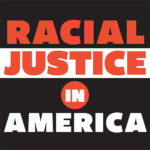Khiara M. Bridges: The hidden agenda in GOP attacks on critical race theory
Berkeley Law scholar describes the campaign as a ‘dangerous’ move against equality, democracy.
July 12, 2021
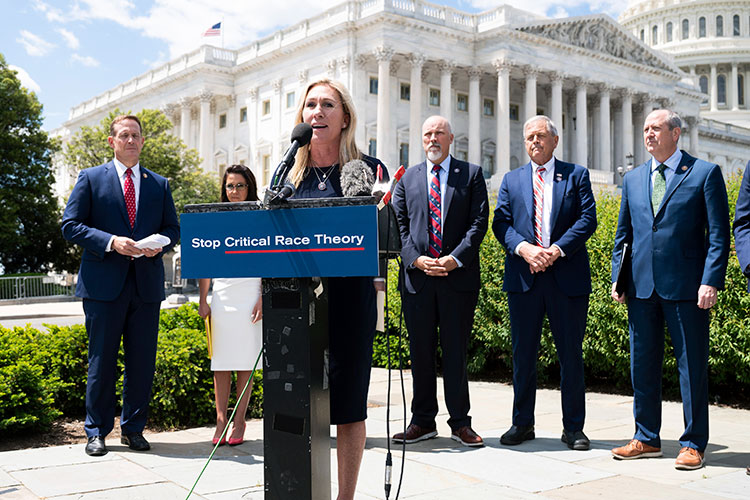
U.S. Rep. Marjorie Taylor Greene (R-Georgia) and other hard-line conservative members of Congress stand before the U.S. Supreme Court and the Capitol at an event denouncing critical race theory. Khiara M. Bridges, a scholar and author at the UC Berkeley School of Law, says the misleading attacks represent a backlash against widespread calls for racial justice. (Photo by Michael Brochstein/Sipa USA via Associated Press)
Late last year, after the police murder of George Floyd, the right-wing mediasphere began to turn its attention to a scholarly field little known outside of law schools and other academic outposts: critical race theory.
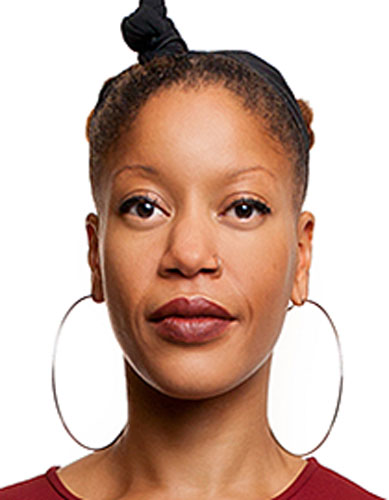
Khiara M. Bridges, law professor (Photo courtesy of UC Berkeley School of Law)
At first it was just one thread in the weave of pre-election coverage. According to UC Berkeley law professor Khiara M. Bridges, author of “Critical Race Theory: A Primer,” the field had been developing for 40 years as a framework for analyzing how the law and other U.S. institutions and processes codify and reinforce racial inequality in areas such as health, education, criminal justice and voting rights.
But following the victory of Democrats Joe Biden and Kamala Harris, the blast furnaces of conservative strategic communication have transformed critical race theory into something Bridges doesn’t recognize.
Republican-allied media routinely label it as racist and divisive. A prominent conservative magazine described it as indoctrination and “racially based shaming of children” in classrooms. One U.S. senator, speaking on a popular right-wing television station, described the legal field as “fatalistic … cynical, ahistorical, sophomoric, insipid, and dumb as a bag of hair.”
As the attacks gained momentum and drifted further from fact, Bridges came to a conclusion: During a blitz of attention to white police violence against Black people, and with communities of color suffering disproportionately from COVID-19, Americans were opening to the idea that racism could be systemic — and deadly.
In response, she says, the right is pressing to change the subject. By promoting a distorted version of critical race theory, influential right-wing leaders and media want to manufacture a menacing boogeyman that can broadly discredit the campaigns for racial justice.
Bridges has written extensively on topics at the intersection of race, gender and law.
[This interview has been edited for length and clarity.]
Berkeley News: You have written a book of 400-plus pages on critical race theory, looking at the legal underpinnings of racism in the United States. It is painstakingly researched, and it’s respected at the highest levels of legal scholarship. With your expertise, how do you explain these attacks?
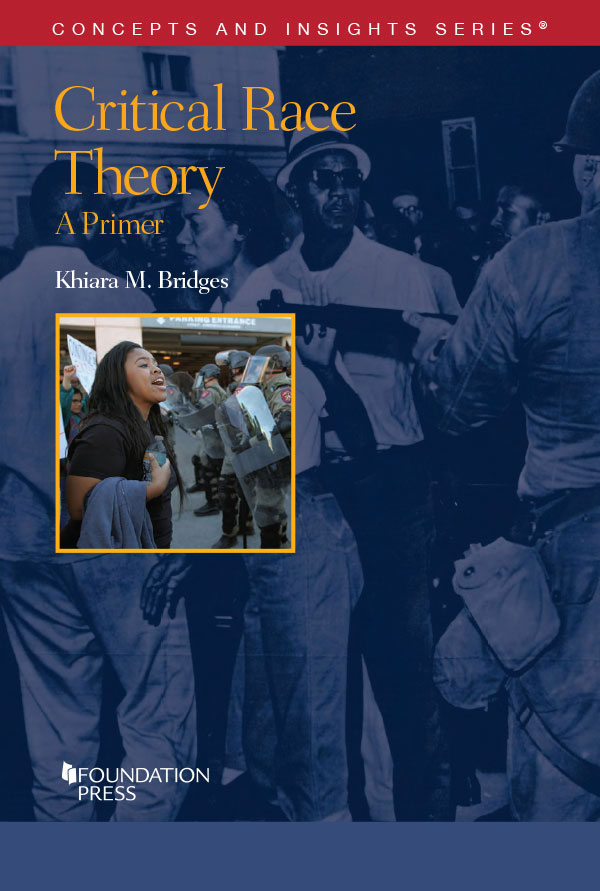
“Critical Race Theory: A Primer,” was written by Berkeley Law professor Khiara M. Bridges and published in 2018 by Foundation Press
Khiara M. Bridges: By now, we all know that these attacks are not about critical race theory. They’re not about the theory that emerged in law schools in the 1970s and ‘80s to explain the failures of the Civil Rights Act of 1964. These attacks are simply using critical race theory, that name, to reference any talk about race and racism that these conservative activists and lawmakers don’t like.
Their descriptions of critical race theory bear no resemblance whatsoever to the theory that I described in some degree of detail in my book. I hesitate to say that it’s even a caricature. I see intentional mischaracterizations. I see blatant falsehoods.
But part of the point of these attacks is to neutralize and delegitimize powerful critiques of American life. And that’s why this present moment is as dangerous as it is, because we ought to critique American life simply because it’s so inconsistent with what the Constitution demands. It’s so inconsistent with the values around equality, justice and liberty for all that the country purports to embrace.
Can you elaborate on that — among the critics, what are their motives and intentions?
Part of it is to keep the base riled up. It’s to keep those folks who are afraid of losing some American ideal that Trump was supposed to protect — to keep them in fear of losing their country.
It’s also to make sure they go to the polls in 2022 and 2024, to vote in a government that would protect “their” America from being “lost.”
Looking back, I’m struck that the campaign against critical race theory seemed to come in the immediate aftermath of George Floyd’s murder. Is there a connection?
The sociopolitical moment that we’re living through right now directly flows from the racial reckoning that we began to have after George Floyd was killed last year. Because when George Floyd was killed in the most brutal and public of ways, many people started to have an epiphany.
Those folks who had tended to think of police as heroes without capes — they saw these nine minutes of brutality. And something happened. They were opened.
I think the country became receptive to hearing racial critiques of the status quo — and people were open to doing something about it.

The police killings of George Floyd, Breonna Taylor and others shocked the world — and opened many Americans to the reality of pervasive violence and discrimination against people in communities of color, Bridges said. (Photo by Becker1999 via Wikimedia Commons, CC by 2.0)
These attacks against critical race theory are a direct response to that. This is the backlash.
Before George Floyd’s murder, there were folks who already knew that racism existed in our society and it manifested in various ways, one of which is police violence. Then there were folks who completely deny that reality.
But there were folks in the middle, on the margins. And after George Floyd’s death, they became receptive to the critiques that groups like Black Lives Matter had been articulating. This present moment is designed to get those folks on the margins back to where they were before May 2020, before they realized that there was something to these critiques about policing and segregated schools and environmental injustice and racial disparities in health, and so on.
Last fall, you really expressed a sense that in the aftermath of Breonna Taylor’s killing and George Floyd’s killing, there was a possibility of movement, of progress. But now, it almost seems like you’re saying that the forces of the racial status quo were in a panic at that point, and they felt they had to do something.
I agree with that, intensely. You know, a lot of people identify Bloody Sunday (March 7, 1965, in Selma, Alabama) as the condition that created the possibility for the Voting Rights Act of 1965. This group of civil rights demonstrators attempted to march over the Edmund Pettus Bridge and they were met with violence and brutality by the police. And it was broadcast across the nation.
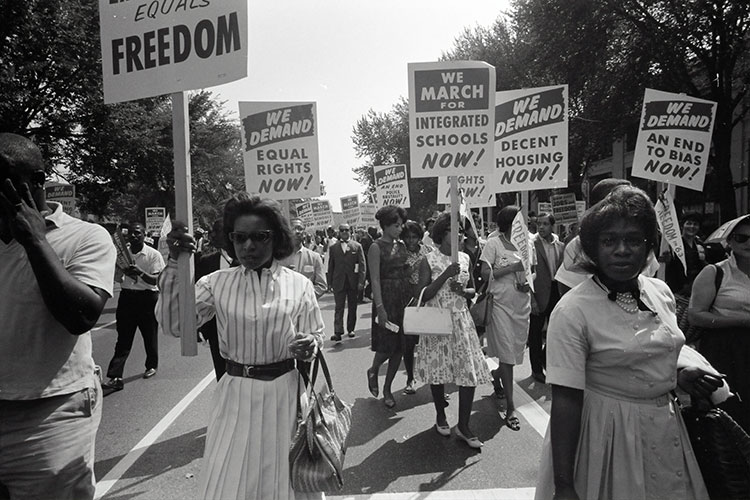
The civil rights movement of the 1950s and ’60 produced historic gains — but still, systemic bias persisted in areas such as health, education and voting rights. Bridges said critical race theory emerged to assess how law and other democratic processes reinforced systemic bias. (Photo by Warren K. Leffler, 1963/U.S. Library of Congress)
People saw these images and they thought, “I cannot believe this. It’s just so clear that these images are inconsistent with our Declaration of Independence and our Constitution and all the things that we purport to hold dear as a country. We ought to do something.”
The Voting Rights Act was passed shortly thereafter.
I think that George Floyd being killed publicly is our Bloody Sunday. We had the possibility of extensive legislation being passed with respect to policing, or in areas like health or public school funding. And the attack on critical race theory is designed to make sure that the equivalent of the Voting Rights Act of 1965 is not passed in 2021.
We talked about the motives and intentions of those who have emerged to attack critical race theory. Do you think there’s an intention to cause confusion and doubt, and in that way to freeze the support for change that was emerging after George Floyd’s killing?
In my scholarship, I hesitate to talk about actors’ intentions because most of the time it’s impossible to divine them. And most of the time, it doesn’t matter. We can just look at the effects of things and critique them based on that. But the bizarre thing about these attacks on critical race theory is that the architects of the attack have been open with their intentions.
For example, Christopher Rufo, the guy who initially went on Fox News in September 2020 before the election, talking about critical race theory, or what he called critical race theory, in these trainings for federal government employees. He has tweeted about his desire to damage the critical race theory brand.
The goal is to have the public read something crazy in the newspaper and immediately think “critical race theory.” We have decodified the term and will recodify it to annex the entire range of cultural constructions that are unpopular with Americans.
— Christopher F. Rufo ⚔️ (@realchrisrufo) March 15, 2021
I read an interview in The New Yorker in which he said that “cancel culture” wasn’t getting folks riled up and “woke culture” wasn’t getting them riled up. But critical race theory, and this is a direct quote: “Critical race theory is the perfect villain.”
In your view, what is their underlying concern, or fear?
Let me be clear: I don’t think that these activists and lawmakers are really concerned about the K-12 curriculum. There’s no danger of actual critical race theory being taught in K-12 schools. It’s an advanced legal theory, and there was never any danger of folks in K-12 schools revising their curricula to incorporate conversations around intersectionality or disparate impact versus discriminatory intent.

After the police killing of George Floyd and the election of Democrat Joe Biden, Fox News and other right-wing media sites dramatically escalated attacks on critical race theory. Much of the coverage has been distorted and deceptive, said Bridges.
Maybe they’re afraid that students might be exposed to basic concepts like structural racism, like systemic racism. They might be afraid that this racial reckoning might bring the New York Times’ 1619 Project into classrooms and students would be exposed to the reality that, even though the slaves were freed in 1863, the repercussions of slavery live on today, so that the past is not really past.
And so they came up with a boogeyman: critical race theory.
There has to be a psychological climate or a political climate that supports the disinformation and allows it to gain traction. Why are some people receptive?
People live in information bubbles. Studies have been done showing that Fox News has mentioned critical race theory practically every other minute for the past six months.
Between Fox News and Twitter and Facebook — that goes a long way toward explaining this newfound interest in a 40-year-old legal theory. It also goes a long way toward explaining why tens of millions of folks believe that the election was stolen and why tens of millions of folks refused to get vaccinated.
But isn’t there also a strong market for the worldview that characterizes critical race theory as threatening?
The folks who are fully in denial about the reality of systemic racism and structural racism, or even interpersonal racism — those folks are the most receptive group to this attack.
The attacks claim that systemic racism doesn’t exist, and that demonstrations of racism are exceptions to the rule. That we triumphed over racism when the slaves were freed and if not then, then definitely in the 1960s during the civil rights movement. So why should we worry about it?
The attacks simply underscore their worldview: Racism is over. The claim that racism persists is a lie, and they don’t want their kids to be taught lies.
In your view, among that subset of people, what’s the most important misunderstanding about critical race theory?
The critics are very focused on the role of the individual. Many of them say critical race theory proposes that all white people are racist, irredeemably so, and that all people of color are victims.
But critical race theory doesn’t propose that all white people are irredeemably racist. Critical race theory doesn’t focus on the individual at all. That’s what race scholarship in the U.S. has traditionally focused on — bigots. Anti-discrimination laws, in particular, have focused on smoking out bigots and running them out of town.
Critical race theory emerged, in part, to say: That’s not what’s doing the heavy lifting when it comes to racial inequality. Bigots aren’t responsible for the fact that Black women are three to four times as likely as white women to die during pregnancy, childbirth, or shortly thereafter. Bigots aren’t responsible for the fact that COVID has been twice as deadly for Black folks and that it decimated Native communities.
We’re interested in structures and systems and processes.
In a way, that’s a critique of post-1960s, mainstream civil rights work.
The critics get it right when they propose that critical race theory is radical.
Critical race theory is dissatisfied with tinkering here and fixing a little bit over there. It grew out of a dissatisfaction with reformist-oriented plans to address the problem of racial inequality in this country. Those plans just hadn’t worked. And going slow and doing things incrementally does not prevent backlash against progress.
So critical race theory holds that we need a dramatic reformulation of American life to achieve racial justice. If racism is embedded in the way that we fund public schools, or the fact that we’re cool with residential segregation, or the fact that some neighborhoods are sites of incredible environmental injustices while others are pristine — if racism is part and parcel of all of the banal policy decisions and norms that have led us to our present moment, then we can’t keep doing things the way we have always done them. We have to do something dramatically different.
For people who are working for racial justice, for those who support it, for students, what’s the best approach right now to counteract this backlash?
Initially, I had been thinking, “This summer I’m going to write an article about these attacks. I’m going to trace the lineage and I’m going to identify historical precedents for attacks on knowledge. I’m going to theorize how un-American that is.” Can you imagine, in America, we’re proposing to ban ideas? I was going to lay out how inconsistent it is with the First Amendment.
And then I decided that would be a distraction. That work should be done, but scholars of race and students ought to respond to these attacks on critical race theory by continuing the work that we were already doing.
We’re doing something right. Our scholarship is trenchant. It is insightful. There is truth to it. That’s why those who vehemently oppose racial justice are up in arms. So we need to keep producing that scholarship. Students need to keep engaging with that scholarship.
We should not let this moment distract us. Instead, we need to we focus on health. We need to focus on education. We need to focus on policing. We need to focus on voting rights — on democracy. We need to focus on all of those things that we were doing before someone discovered that the term “critical race theory” is catchy in focus groups.
